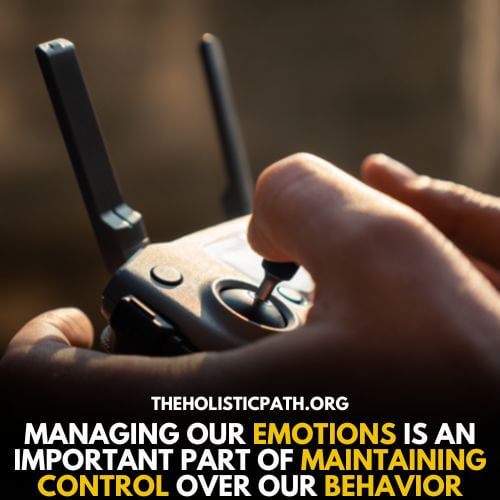It’s well known that our emotions affect the way we behave. But what exactly are emotions, and how can emotions affect our behavior? This article will explore the different types of emotions and discuss how they can affect our daily lives.
We’ll also look at ways to manage our emotions in order to stay in control of our behavior. The importance of understanding our emotions and their impact on our lives cannot be overstated, so read on for more information.
How Do Emotions Affect Our Behavior
When we experience different emotions, it can have a profound effect on our behavior. Like, when we are angry, we may be more likely to lash out or behave aggressively.
Whereas, when we are feeling anxious or scared, we may be more likely to withdraw or become clingy. These are just a few examples, but the point is that our emotions can definitely influence how we act.
There are a number of different factors that can affect how our emotions influence our behavior. The intensity of the emotion can play a role, as well as the nature of the emotion itself. Also, our personal history and life experiences can also influence how our emotions impact our behavior.
All in all, it is clear that our emotions do have an impact on how we behave. It is important to be aware of this so that we can understand why we might be behaving in a certain way. So that we can work on managing our emotions in a healthy way.
The Different Types Of Emotions And How They Can Influence Us
There are a number of different types of emotions, and each can affect us in different ways. Some emotions are more intense than others and can cause us to behave in ways that we might not normally do. Here is how different emotions affect our behavior:
1. How Anger Influences Us:
Anger is a negative feeling that is associated with frustration and hostility. When we’re angry, we may feel irritated or angry. We may also want to fight or scream. Anger can affect us in a number of ways as well.
For example, it can lead to aggressive behavior or violence. It can also damage relationships with others. Anger can also be harmful to our health, causing things like high blood pressure or heart problems.
When we feel angry, our heart rate and blood pressure increase and we may feel a surge of energy. We might feel like we need to take action, to do something to make the person or situation that angered us “pay.” This can lead to aggressive or destructive behavior.

2. Sadness Can Also Effect Us:
Sadness is a negative feeling that is associated with pain and loss. When we’re sad, we may feel down or depressed. We may also be less motivated and have less energy. Sadness can have a profound affect on us in a number of ways.
For example, it can make us feel isolated or lonely, and it can cause us to dwell on our problems. Sadness can also lead to physical problems such as headaches, stomachaches, or insomnia.

Sadness is a feeling of sorrow and emptiness. When we’re sad, we may cry and feel lethargic. We may have trouble focusing and concentrating. Often, people in a sad state will withdraw from others.
3. How Does Happiness Influence Us:
Happiness is a positive feeling that is associated with pleasure and joy. When we’re happy, we tend to be more positive and upbeat. We may also be more social and outgoing. Happiness can affect us in a number of ways.
One big way happiness can affect us is, it can make us feel more optimistic about the future. It help us to see the glass as half full instead of half empty. Happiness can also make us more productive and motivated.
Happiness is a feeling of joy and pleasure. When we’re happy, our mood is elevated and we feel energetic. We may smile and laugh more frequently. Happy people tend to be more social than those who are sad.
4. Influence of Disgust On Us:
When we experience disgust, our nose wrinkles, and our mouth turns down. We may feel like we need to get away from whatever it is that disgusts us. Disgust often leads to avoidance behavior.
5. Fear Can Influence Us Greatly:
Fear is an emotion that’s designed to keep us safe. When we’re afraid, our heart rate increases and we may start to sweat. We may feel like we need to run away or hide from the thing that’s scared us. Fear often results in protective behavior.
The Importance Of Understanding Our Emotions And How It Affects Our Lives
When we’re able to understand our emotions, we’re able to control them better. We become more aware of how our emotions are affecting us and how we’re reacting to them. This understanding allows us to better manage our behavior in difficult situations. It also helps us to have a better understanding of ourselves and why we react the way we do.
Understanding our emotions is an important part of self-awareness. When we’re aware of our feelings, we can better deal with them and keep them from impacting our lives negatively. It’s also important to understand the emotions of others. This can help us to better communicate with them and build stronger relationships.
Overall, understanding our emotions is a valuable tool that helps us to live happier, healthier lives. It allows us to be more in control of ourselves and our reactions, which ultimately makes us more successful in everything we do.

How To Deal With Strong Emotions That Can Affect Our Behavior
There are a number of different techniques that we can use to deal with strong emotions. One of the most important things is to recognize when we’re feeling emotional and why. Once we understand why we’re feeling a certain way, it’s easier to manage our behavior.
When feeling angry there is one technique that can be helpful; count to 10 or 20 before responding to something. This will give us time to calm down and think more clearly. Another technique is deep breathing or meditation; these techniques can help to calm us down and get our emotions under control.
If we’re feeling sad or depressed, one technique is journaling. Writing about our thoughts and feelings can help us to work through them and understand them better. It can also help us to find solutions or ways to cope with them.
It is also important to have a support system when dealing with strong emotions. When we have people who care about us and are there for us, it makes it easier to deal with difficult times. Talking openly about our feelings and emotions can also help us process them better.
Managing our emotions is an important part of maintaining control over our behavior. When we’re able to keep our emotions in check, we’re less likely to act impulsively or do something that we’ll regret later on. Learning how to deal with strong emotions takes time and practice, but it’s well worth it in the end.

How Can We Identify The Emotions That Are Driving Our Behavior
One of the most important aspects of managing our emotions effectively is being able to identify which emotions are driving our behavior. When we can accurately identify our emotions, we can then take steps to manage them more effectively.
One way to do this is by using a technique called ‘The Feeling Wheel‘. This technique involves identifying the different emotions that we are feeling and then rating them on a scale from 0-10, with 10 being the strongest feeling.
Once we have rated all of our feelings, we can then begin to understand which emotions are driving our behavior. Like, if we are feeling a lot of anger (rated at 8 or 9), it is likely that this emotion is driving our behavior more than any other emotion. Alternatively, if we are feeling a lot of anxiety (rated at 5 or 6), it is likely that this emotion is driving our behavior more than any other emotion.
By understanding which emotions are driving our behavior, we can take steps to manage them more effectively.
For example, if we are feeling angry, we can try to calm down by taking some deep breaths or counting to 10. If we are feeling anxious, we can try to relax by focusing on our breath or by doing some gentle stretches.
20 Ways To Manage Our Emotions In Order To Stay In Control Of Our Behavior
There are a variety of ways that we can employ to manage our emotions in order to stay in control of our behavior.
- Recognize what emotions you are feeling and name them.
- Take a few deep breaths and centre yourself.
- Count to 10 or 20.
- Distract yourself with an activity or task.
- Exercise.
- Talk to a friend or family member.
- Journal your thoughts and feelings.
- Take a hot bath or shower.
- Relax in a comfortable spot.
- Practice meditation or mindfulness.
- Pay attention to your body language and adjust as needed.
- Practice positive self-talk.
- Seek professional help if needed.
- Avoid caffeine, alcohol, and other stimulants.
- Get enough sleep.
- Eat healthy foods.
- Avoid stressors whenever possible.
- Seek guidance from a trusted source.
- Accept that not everything can be controlled.
- Allow yourself time to grieve.
5 Tips For Keeping Emotions In Check And Avoiding Any Negative Consequences
When it comes to our emotions, it is important to find a healthy balance. If we allow our emotions to get out of control, it can lead to negative consequences in our lives. Here are five tips for keeping your emotions in check and avoiding any negative consequences:
1. Make time for yourself:
When we are constantly busy and stressed out, it can be difficult to manage our emotions. Make time each day for yourself, even if it’s just 10-15 minutes, to relax and de-stress. This will help you to stay calm and in control when faced with difficult situations.
2. Avoid letting your emotions build-up:
Don’t let your emotions accumulate over time. If you feel like you’re about to reach your breaking point, deal with them head-on before they get worse. Ignoring your feelings will only make them stronger and harder to manage in the long run.
3. Seek professional help:
If you find that you’re struggling to manage your emotions on your own, seek professional help from a therapist or counselor. They can help you understand and deal with your emotions in a healthy way.
4. Express your feelings:
Bottling up your feelings is not healthy and will only lead to further emotional distress down the road. Find outlets where you can express your feelings safely, such as writing in a journal or talking to a trusted friend or family member.

5. Take care of yourself:
Take care of yourself both physically and mentally by eating healthy foods, getting enough exercise, and taking breaks when needed. This will help keep your mind and body strong, which will, in turn, help you better manage your emotions.
How Can Emotions Affect Our Behavior-Conclusion
In conclusion, understanding our emotions is a valuable tool that helps us stay in control of our behavior. When we’re able to understand what we’re feeling and why we can take steps to deal with them.
Managing our emotions is an important part of our lives, not only does it help us stay in control but it also allows us to have better relationships with the people around us. We’re better able to communicate when we understand how we’re feeling and why. By managing our emotions, we’re more likely to be happy and content with life.
